Korean Games: From Childhood Challenges to Drinking Games
Discover Popular Korean Games, From Classics to Modern Favorites, like the APT. Drinking Game!
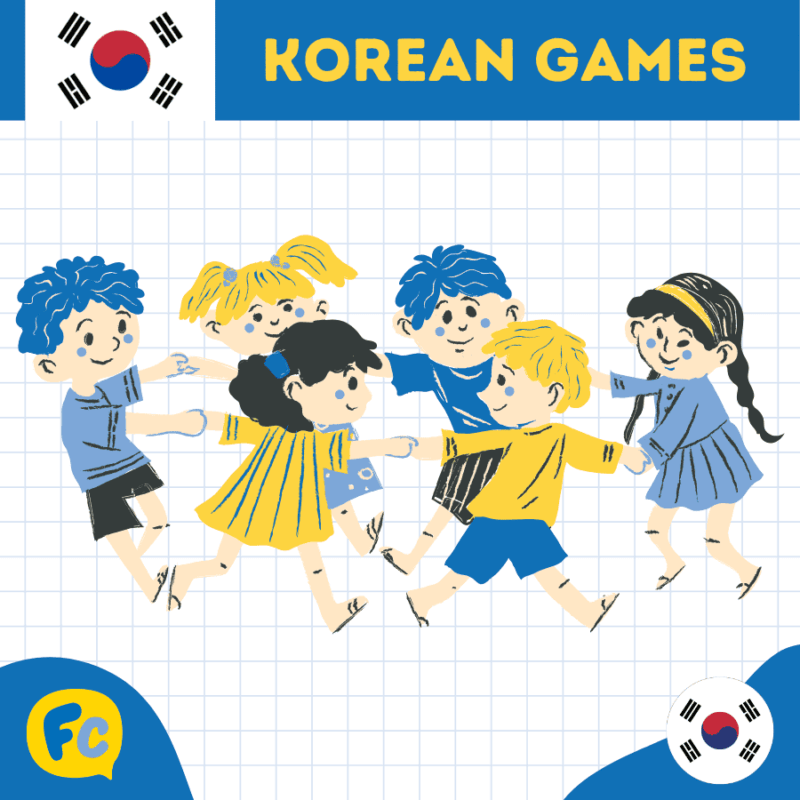
Learning about Korean games gives a unique insight into traditional and contemporary games that Koreans enjoy playing.
Unlike food or films, games aren’t a highly talked-about subject on the internet – Squid Game aside!
Through this blog, you’ll get to know Korean games that you and your friends could also try out – from children’s games to drinking challenges!
Let’s begin with some traditional Korean games that are still widely played as entertainment!
Korean Games | Traditional Korean Games
Korean Games | Korean Kids’ Games
Korean Games | Korean Drinking Game
Korean Games | BONUS: APT Drinking Game
Korean Games | FAQ
Korean Games | Traditional Korean Games
Traditional games in Korea are more than just entertainment; they are a part of Korea’s cultural heritage, often associated with important holidays and communal gatherings.
윷놀이
YutnoriYutnori is one of the oldest and most popular traditional games, especially played during 설날 (seollal) or Korean Lunar New Year in English.
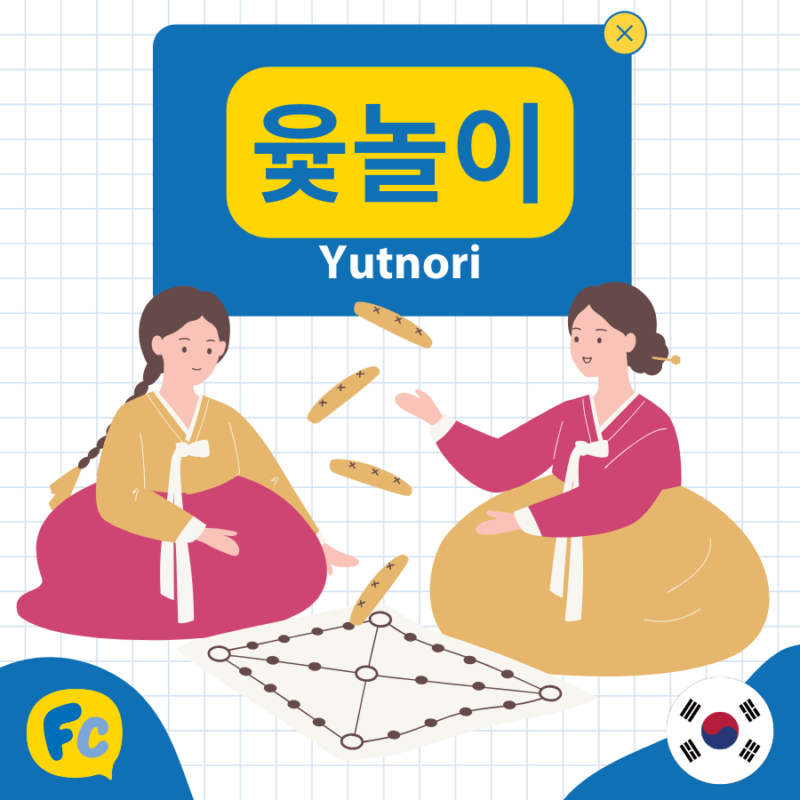
This game, which involves both luck and strategy, is played with a board and four wooden sticks, called yut.
The game is simple, with players divided into two teams. The goal is to move all your tokens around the board first.
Depending on how the yut sticks land—either flat or curved side up—players move the tokens accordingly.
Each team consists of 4 tokens. If you’re fortunate, you may land on a corner square, allowing you to take a shortcut.
When you throw the sticks, they can land with the flat side down or up. Here’s what each result means:
– If only one stick has the flat side up: it’s called 도 Do, and you can move 1 space.
– If two sticks land with the flat side up: it’s a 개 Gae, allowing you to move 2 spaces.
– When 3 flat sides are up: it’s called 걸 Geol, and you can move 3 spaces.
– If all four sticks have the flat side up: it’s a 윷 Yut, and you can move 4 spaces. You can even get a bonus turn with this result.
– Landing all sticks with the flat side down: is called 모 Mo, and this gives you the highest score, letting you move 5 spaces. Just like Yut, this result can also give you an extra turn.
A famous Korean saying is derived from this game:
모 아니면 도
All or nothing모 (mo) in the game of 윷놀이 (yutnori) refers to when all the flat side faces down
도 (do) in this game refers to one flat side of the stick is up
=> Meaning one stick can make such a difference– All or nothing, go big or go home.
줄다리기
Korean Tug-of-WarPlayed during festivals or harvest celebrations, it was believed that the winning team would enjoy a prosperous year of farming.

Juldarigi, or Korean tug-of-war, is a traditional game with roots in agricultural communities.
Two teams compete by pulling a string against each other.
Despite its competitive nature, this game is actually part of a ritual that symbolizes harmony among community members. The entire process is led by elders who are responsible for involving the younger generations in order to strengthen the community as a whole.
Juldarigi is not just a physical competition; it holds great cultural significance as well. UNESCO has acknowledged this traditional game as an Intangible Cultural Heritage, highlighting its crucial role in Korean history and its ability to promote a sense of community.
씨름
SsireumSsireum is traditional Korean wrestling, similar to Japan’s sumo.
In Ssireum, two players wearing long fabric belts use various techniques to bring their opponents to the ground.

Traditionally, the winner of the game received an ox and the title of 천하장사 (cheon-ha jang-sa) which means ‘the strongest men’, parading around the neighborhood on the ox in celebration.
Ssireum games take place on sand and are open to community members of all ages. They are played on various occasions, including traditional holidays, market days, and festivals.
Different regions have developed variants of Ssireum, but they all aim to enhance community spirit and collaboration.
This sport is part of Korea’s Intangible Cultural Heritage of Humanity.
제기차기
JegichagiJegichagi is similar to the Western game of hacky sack.
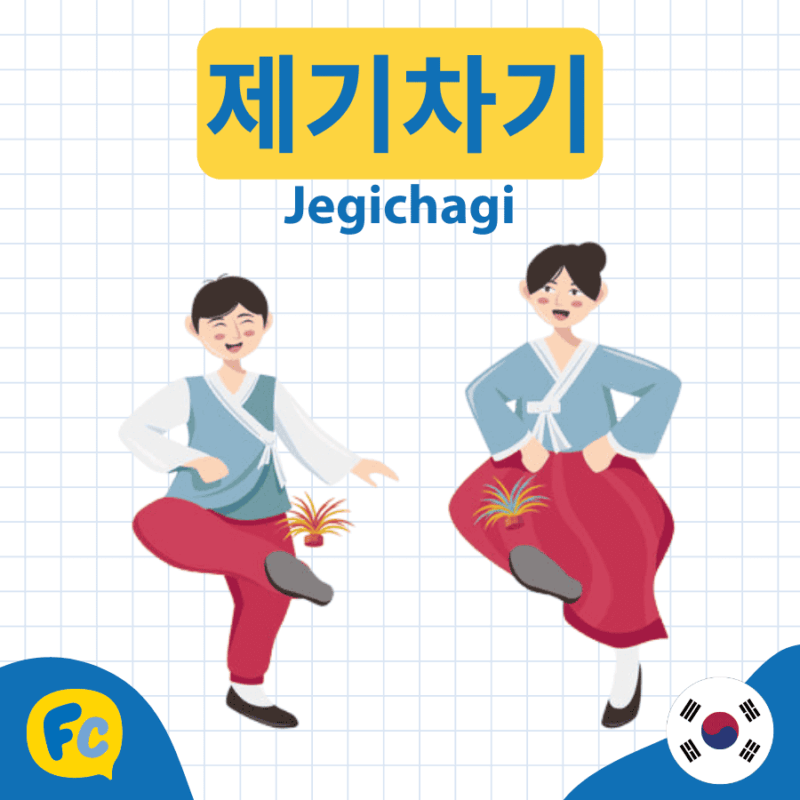
The game is played with a jeggi, a small weighted object made of paper or cloth, and the goal is to keep it in the air by kicking it without letting it fall to the ground.
Jegichagi is often played during the Korean Lunar New Year, but it’s a year-round favorite among children. It’s a test of balance, coordination, and footwork, and it’s often a friendly competition to see who can kick the jeggi the most without dropping it!
Korean Games | Korean Kids’ Games
공기
GonggiGonggi is a classic Korean children’s game, resembling the Western game of jacks but without the use of a ball.
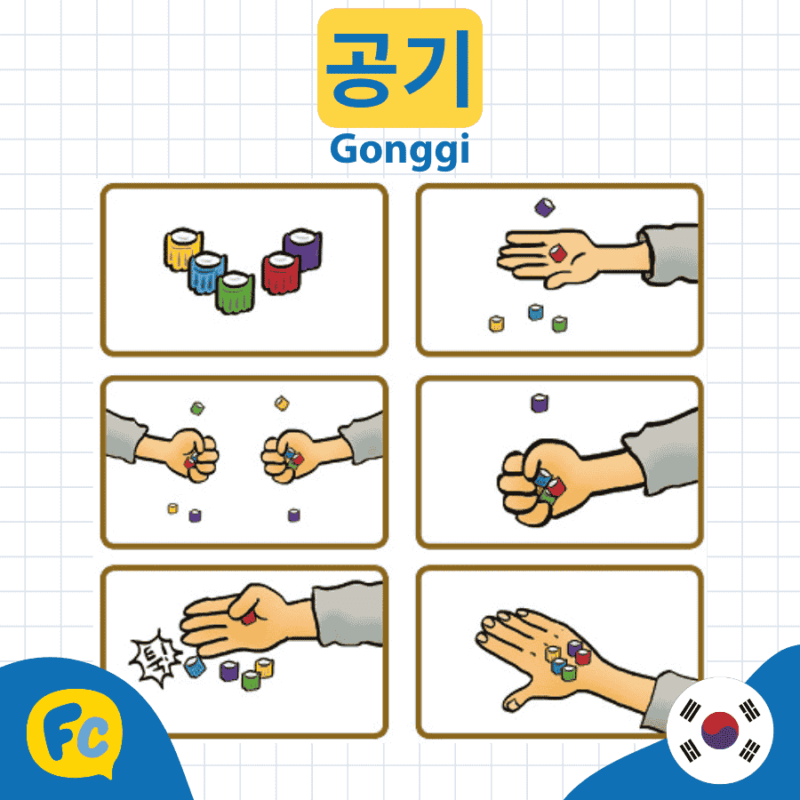
Players use five small stones or pieces, and the objective is to toss one piece in the air, pick up another piece from the ground, and then catch the falling piece with the same hand.
The game involves multiple stages of increasing difficulty, each requiring more skills.
What makes Gonggi popular is that it can be played anywhere, needing only a small, portable set of stones. It’s often a competitive yet friendly game among children, and adults can also be found joining in for nostalgia.
딱지
DdakjiDdakji is a Korean version of the well-known game of Pogs or Milk Caps.
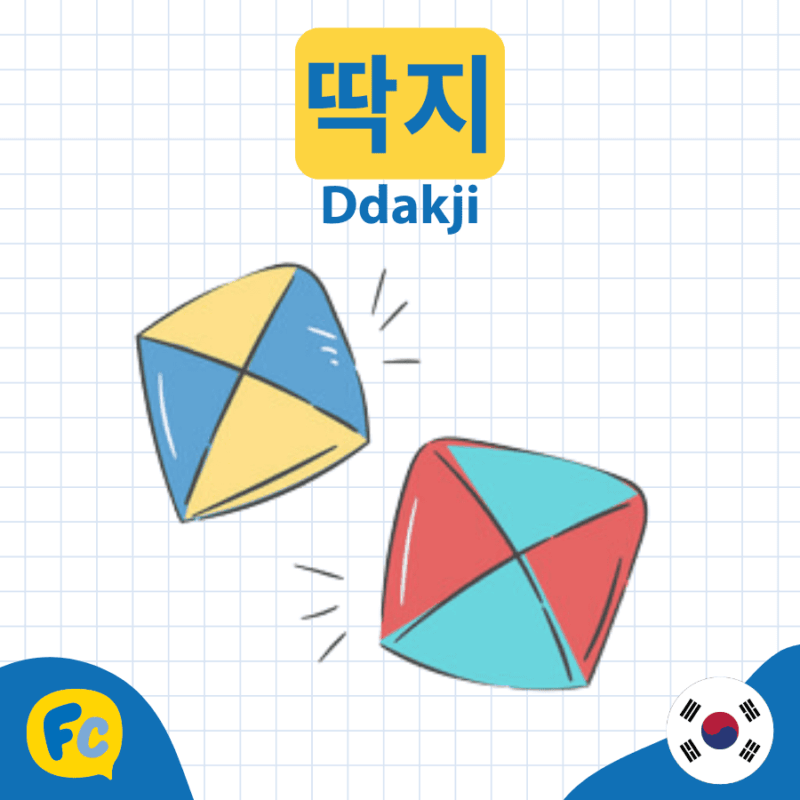
In Ddakji, players fold paper into square tiles and take turns trying to flip their opponent’s piece by slamming their own tile onto it.
If they successfully flip the opponent’s Ddakji, they get to keep it.
This game became internationally known after being featured in the hit TV series 오징어 게임 , or Squid Game in English, but it has long been a playground staple in Korea. It requires a mix of skill, technique, and sometimes a bit of luck, making it a popular game to play among kids.

Chuseok in South Korea | Mid-Autumn Festival Explained
What is Chuseok? Want to know more about the Korean Thanksgiving? Find out what Koreans do during this day, what they eat, and when the festivities are!
Korean Games | Korean Drinking Games
We all know Koreans love to drink and have a strong drinking culture.
To keep the mood lively and fun, a wide array of drinking games has emerged, adding excitement and humor to gatherings.
Baskin Robbins 31
No, this game has nothing to do with the ice cream brand, despite the name!
Baskin Robbins 31 is a counting game where players take turns counting from 1 to 31. Each player can say one, two, or three numbers in sequence. The person forced to say “31” must take a drink.
The game is all about strategy and timing. By controlling how many numbers you say, you can try to force the next player to lose. It’s a fun and suspenseful game that can really get everyone to participate during a drinking session.
3-6-9 Game

The 369 game is a fun drinking game popular in Korea that mixes counting with a twist.
Players take turns counting in order, but whenever a number contains a 3, 6, or 9, they have to clap instead of saying it.
For instance: instead of saying “3,” “6,” or “9,” a player would clap their hands.
If someone forgets to clap or accidentally says the number, they must take a drink. The game takes speed as the numbers go up, making it a lively and entertaining part of any social gathering.
Now that you have learned some popular Korean games, try out some of the games with your friends.
Korean Games | BONUS: APT Drinking Game
No doubt you’ve heard the hit song APT by ROSÉ and Bruno Mars.
But what you might not know is that APT is actually a song about a Korean drinking game!
The APT drinking game (short for “Apartment Drinking Game”) is a fast-paced and rhythmic Korean drinking game. It’s popular at gatherings and is both simple and fun, especially as the pace picks up.
How to Play:Players set a steady rhythm by clapping or tapping on the table, often starting with a chant like:
”
아파트!
[clap-clap]
아파트!
[clap-clap]” (“Apartment! Apartment!”).The leader names a number between 1 and 5, which represents “floors” of an apartment building.Going in order, players raise their hands to match the number called, with the group’s total hand count needing to equal the leader’s number exactly. For example, if the leader says “3,” the group must collectively raise exactly 3 hands.If anyone raises too many or too few hands, they lose and must drink as a penalty.
Why Is It Called “APT”?
The game’s name refers to “building floors” of an apartment, with each player’s hands representing the floors being “constructed.”
This game is perfect for lighthearted fun, but keeping focus is key as the rhythm gets faster!
Korean Games | FAQ
What are the games featured in Squid Game, and are they real Korean games?
Yes, most of the games in Squid Game are based on real traditional Korean children’s games. For example:
Red Light, Green Light (무궁화 꽃이 피었습니다) is a common playground game.
Dalgona Candy Game involves carving shapes out of a sugar candy, a popular street snack from the 70s and 80s.
Squid Game (오징어 게임) is a physical game that was widely played by kids in Korea during the 70s and 80s.
How do you say game in Korean?
게임 (game) – Game
Koreans sometimes also say 놀이 (no-ri) which translates to play(noun).
What are some popular traditional Korean children’s games?
Some traditional games include:
Yutnori (윷놀이): A board game using four wooden sticks, played especially during holidays like Lunar New Year.
Jegichagi (제기차기): A game where players kick a shuttlecock-like object into the air.
Gonggi (공기): A game using small stones, similar to jacks.
What are some modern Korean drinking games?
Modern Korean drinking games are fun and creative. Popular ones include:
Soju Cap Game (병뚜껑 게임): Flicking the twisted cap of a soju bottle to break it off.
Titanic (타이타닉): Floating a shot glass in beer and pouring soju until it sinks.
Baskin Robbins 31 (베스킨라빈스31): Players count numbers from 1 to 31, and the one forced to say “31” drinks.
How do you say win in Korean?
이기다 (yi-gi-da) – to win
이겼다 (yi-hyut-da) – I won
How do you say lost in Korean?
지다 (ji-da) – to lose
졌다 (jyut-da) – I lost
Want More From LTL?
FANCY LEARNING KOREAN? Check out our online Korean courses here.
We offer a 7-day free trial to all online students where you can study Korean 24/7.
Want to study Korean in Korea instead? Our Korean courses in Seoul can either be taken in small groups of no more than 5 students or individually for a more tailored experience.
We even offer incredible homestay experiences in Seoul too.
To top it all off, it certainly doesn’t end with Korean. Check out the other languages we teach 👇🏻









